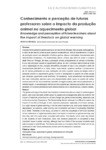Mostrar o rexistro simple do ítem
Conhecimento e perceção de futuros professores sobre o impacto da produção animal no aquecimento global
| dc.contributor.author | Almeida, António | |
| dc.date.accessioned | 2019-03-13T08:08:03Z | |
| dc.date.available | 2019-03-13T08:08:03Z | |
| dc.date.issued | 2015 | |
| dc.identifier.citation | Ambientalmente Sustentable, 2015, 20: 205-220. ISSN: 1887-2417 | es_ES |
| dc.identifier.issn | 1887-2417 | |
| dc.identifier.uri | http://hdl.handle.net/2183/22197 | |
| dc.description.abstract | [Resumo] O aquecimento global do planeta acentuou-se nas últimas décadas, fruto da ação antropogénica, e muito se tem escrito sobre as suas causas e consequências. Mas só recentemente o impacto da produção animal nas alterações climáticas ganhou alguma notoriedade, impulsionada pelo documentário Cowspiracy: The Sustainability Secret, embora seja difícil de avaliar o impacto deste filme em Portugal. De facto, a produção animal, principalmente de animais ruminantes, é uma das principais causas do aquecimento global, se não a principal, relacionando-se ainda com a degradação do solo, poluição atmosférica, escassez de água e sua poluição e perda de biodiversidade (Steinfeld et al. 2006). Assim, neste estudo, quisemos verificar o conhecimento de 38 futuros professores de duas instituições de ensino superior acerca da relação entre a produção animal e o aquecimento global, e como a hierarquizam no quadro de outras causas que conduzem igualmente a este fenómeno. Os resultados, muito semelhantes nos estudantes das duas instituições, apontam para uma desvalorização desta causa no quadro de outras, embora cerca de 2/3 dos estudantes inquiridos consigam explicar, pelo menos parcialmente, a referida relação. A desvalorização referida permite suspeitar que este assunto poderá não vir a ser abordado no contexto profissional futuro destes docente com a relevância que o mesmo merece | es_ES |
| dc.description.abstract | [Abstract] The global warming of the planet has increased in recent decades as a result of anthropogenic action, and much has been written about its causes and consequences. But only recently the impact of livestock production on climate change has gained some notoriety, especially due to the documentary Cowspiracy: The Sustainability Secret, although it is difcult to assess the impact of this flm in Portugal. In fact, livestock production, especially of ruminant animals, is a major cause of global warming, if not the most important one, and is also related to land degradation, air pollution, water scarcity and its pollution and loss of biodiversity (Steinfeld et al. 2006). Therefore, in this study, we aimed to verify the knowledge of 38 future teachers of two institutions of higher education about the impact of livestock on global warming, and how they rank this cause when compared with others. The results, which were very similar in the students of both institutions, show that livestock production is considered a less important cause in global warming, although near two thirds of the surveyed students were able to explain it scientifcally. The results also allow us to suspect that this matter will not be addressed in their future professional context with the relevance it deserves. | es_ES |
| dc.language.iso | por | es_ES |
| dc.publisher | Universidade da Coruña, Servizo de Publicacións | es_ES |
| dc.rights | Atribución-CompartirIgual 3.0 España | es_ES |
| dc.rights.uri | http://creativecommons.org/licenses/by-sa/3.0/es/ | * |
| dc.subject | Produção animal | es_ES |
| dc.subject | Aquecimento global | es_ES |
| dc.subject | Professores em formação | es_ES |
| dc.subject | Animal production | es_ES |
| dc.subject | Global warming | es_ES |
| dc.subject | Training teachers | es_ES |
| dc.title | Conhecimento e perceção de futuros professores sobre o impacto da produção animal no aquecimento global | es_ES |
| dc.title.alternative | Knowledge and perception of future teachers about the impact of livestock on global warming | es_ES |
| dc.type | info:eu-repo/semantics/article | es_ES |
| dc.rights.access | info:eu-repo/semantics/openAccess | es_ES |
| UDC.journalTitle | AmbientalMente Sustentable: Revista científica galego-lusófona de educación ambiental | es_ES |
| UDC.volume | 20 | es_ES |
| UDC.startPage | 205 | es_ES |
| UDC.endPage | 220 | es_ES |
| dc.identifier.doi | https://doi.org/10.17979/ams.2015.02.020.1586 |






